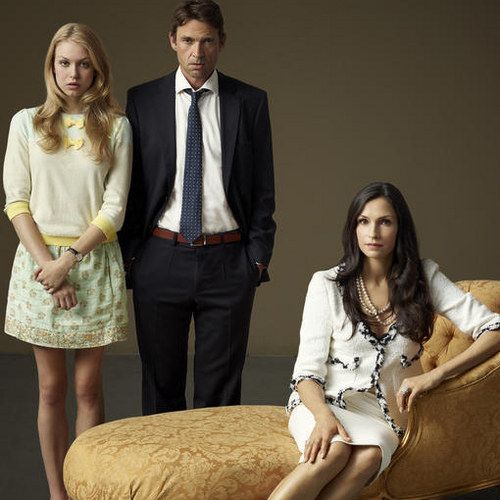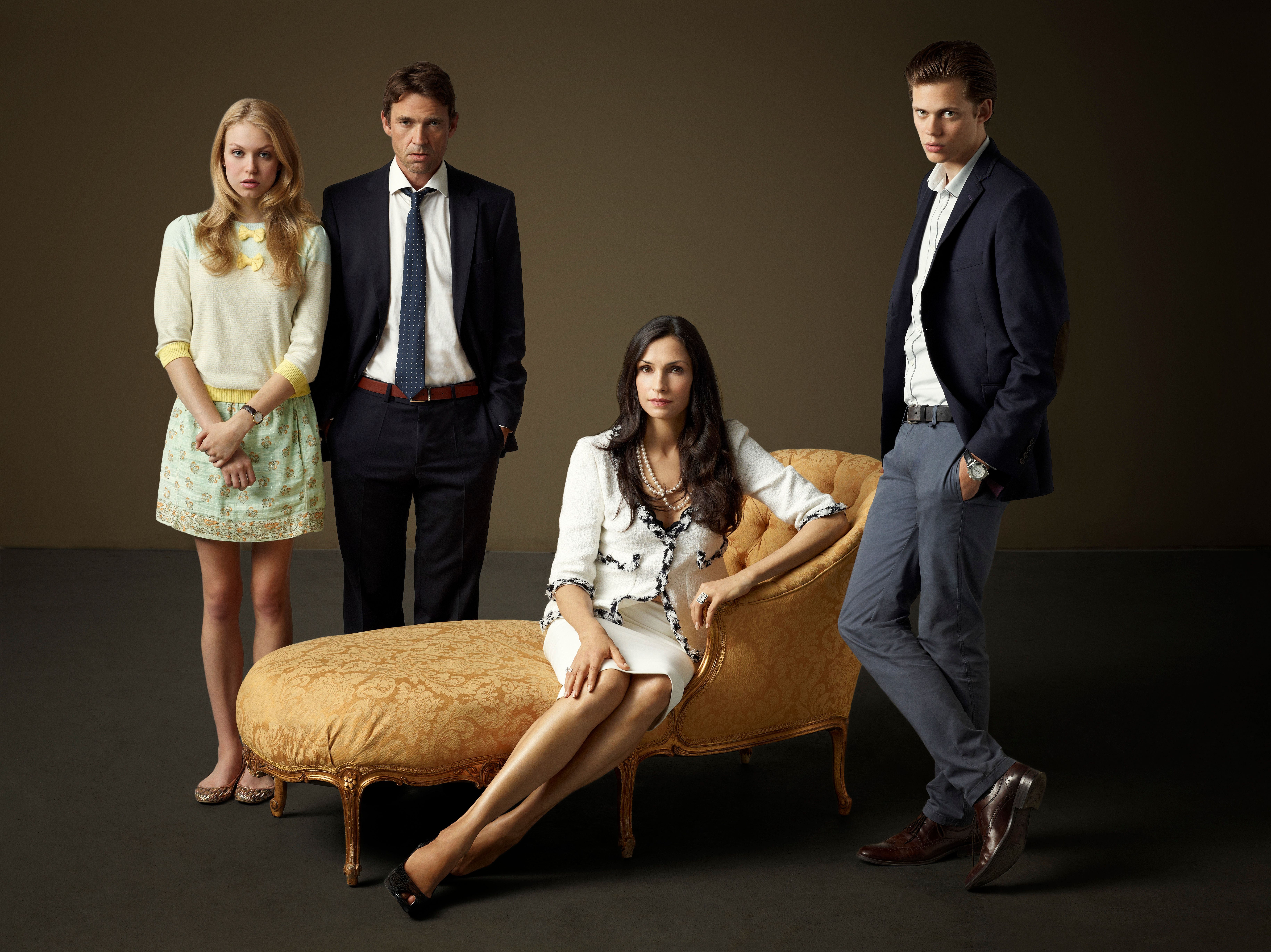Executive producers Brian McGreevy, Lee Shipman, and Mark Verheiden talk Hemlock Grove Season 1, debuting in its entirety Friday, April 19 on Netflix
After a successful run with House of Cards, Netflix is delving into the horror genre with their latest original series Hemlock Grove, debuting all 13 episodes at the same time starting Friday, April 19th with the Season 1 premiere "Jellyfish in the Sky".
Executive producers Brian McGreevy, Lee Shipman, and Mark Verheiden recently spoke about the new series, the characters that inhabit this title town, and much more.
Brian McGreevy first spoke about the monsters fans will see throughout the first season.
"There's no shortage of monsters on the show, and they tend to fall into a couple of different varieties, which is the main theme of the show. It's sort of asking the question what separates a human from a monster. The show is significantly supernatural. The series kicks off when a young high school girl is murdered in the town of Hemlock Grove, which is a southwestern Pennsylvania former steel community. There's this sort of assembly of very odd characters, many of whom are harboring some kind of secret or agenda, who all have varying reasons for getting caught up within it."
Lee Shipman explains that these strange events happen at the same time as a new arrival to town, played by Landon Liboiron.
"This murder happens at the same time as this new gypsy kid moves into town. Liboiron has some weird unspoken connection he feels with Bill Skarsgård, who is the son of the wealthy family that runs the town. It's these two guys on either side of the tracks that come together."
The series is based on a graphic novel written by Brian McGreevy, who spoke about why the Netflix model really sparked their interest.
"When we were shopping around this project, it was based on a novel I had written. One of the reasons Netflix was so attractive to us was because we knew that they had this straight‑through series model. When we were looking at the architecture of the overall season, on the one hand, when you're writing a pilot and trying to get the pilot sold, you approach the story differently than you would when you're looking at the entire thing as essentially a 13‑hour movie adaptation of a novel. That said, the hope is that there's wildly interesting things happening on a regular basis."
Mark Verheiden spoke about why they decided to shoot in Toronto, doubling the Canadian city for a run-down Pennsylvania steel town.
"Toronto is a great location and it has a wonderful steel‑town sort of feel to it. We originally were thinking of shooting elsewhere but ended up in Toronto, and I think it ended up being a good thing for the show because beyond the steel town, there's just this wild variety of great locations. We're shooting in a fantastic mansion that we found all sorts of interesting places to go in there."
Brian McGreevy also explained that the mansion in the show may seem familiar to some comedy fans.
"It's actually the mansion from Billy Madison so it has quite a cinematic legacy."
Brian McGreevy also spoke about Eli Roth's involvement as executive producer.
"Eli is someone who's actually a pretty fascinating and multi‑talented guy, who's extremely interested in expanding his own brand. He was actually a protégé of David Lynch's. For years, people were essentially trying to get him to do whatever version of Hostel the series, which he felt like creatively he'd been there and wasn't interested in doing that. The way that he sees the world and that we, the writers, see the world, is that emotional violence and physical violence are not actually that unrelated, and we're very attracted to both. So that was a happy marriage."
When asked about the process of shopping the show to other networks, Brian McGreevy revealed they were never interested in a standard Big Four network.
"When we were shopping the show around, we definitely had excluded conventional broadcast networks because the jefe of the show was Eli Roth. I think we were looking to be roughly on par with the Showtime and HBO level, which happened to jive with at least what they seemed to be looking for. We ruled out pretty early on the conventional broadcast networks. It's funny. We all came together shortly after the House of Cards deal had been announced, and Lee and I looked at each other, like, 'Okay. Shoot. That's the future of the medium.' We did go to some of the more conventional premium networks and actually had an auction within the first day, but we were holding out for Netflix because, for us, they were the most exciting partners."
Mark Verheiden, who has produced shows such as Falling Skies, spoke about how much creative control Netflix gives you.
"It was different in a few ways. One, there was a great deal of freedom with Netflix, and some of that freedom is just in terms of how you've set up the show. We don't have to have commercial breaks. There are no time limits. Just in that aspect, and in terms of language and standards, they're more liberal than they were on the Syfy Channel. I think the other thing we had on this that was different than a regular show is that we were working from Brian's novel. We knew for the show where we wanted to go from the minute we sat down to start breaking down the stories. That's kind of novel for television to actually have your beginning, middle, and end when you start out. We really embraced that. Finally, there's the idea that you don't have to catch up on every episode. They're releasing all 13 at once. You can watch all 13 at once, and it is like a long 13‑hour movie as opposed to episodic television, where you catch up every week and have to do those things to keep the audience involved."
Lee Shipman revealed that, while the first season is based on the graphic novel, they also pitched ideas for additional seasons that expand the world.
"In the pitching of this series, the first season is based on the novel, but we also pitched additional seasons and the kind of expansion of this world and where we go from there."
Brian McGreevy also spoke about adapting his graphic novel for another medium.
It turns your brain into a Dali painting a little bit. It's extremely surreal. At a certain point, because, writing a novel, that book took six years to write. When you're making a series, you have six months to produce 13 hours. It's just the logistics of it alone that are so overwhelming that you don't really have time to think. It's sort of like riding a bicycle. It's like, okay, if I think about what I'm doing, then I'm going to end up massively injured. So like "protosorially" attacking the writing, everything was just moving so fast that you'd either pick it up or you don't. Lee and I have been screenwriting partners since graduate school, so it was like having a voice right there that, if I was getting too close to too cavalier, and saying, "Oh, we can cut this" or "We don't need that character," et cetera, et cetera ‑‑ Lee was someone whose voice I inherently trusted. He was like that external thing that I would have required. And the other thing that's sort of delightful along the way is that, when you bring in a cast, especially a cast on the level that we have, as writers it's like -- I created these people six years ago. It was, like, "Oh, wow, I'm learning things about these people from the people that we've brought on board." So that's one of the things that's actually, really cool and unique to this process as opposed to the solitary process of writing a novel."
Hemlock Grove debuts all 13 Season 1 episodes Friday, April 19 starting with the premiere "Jellyfish in the Sky".


